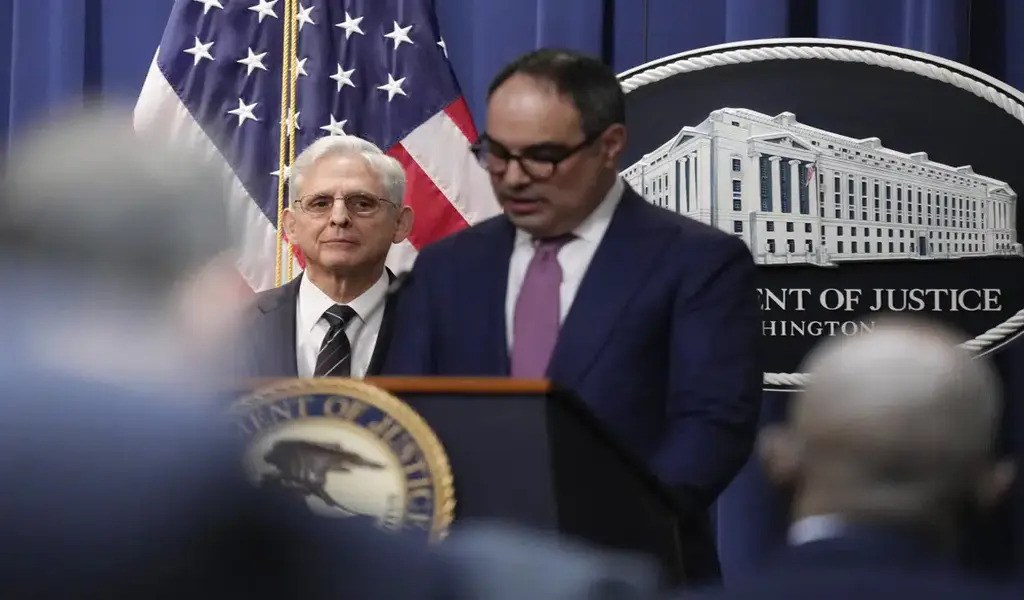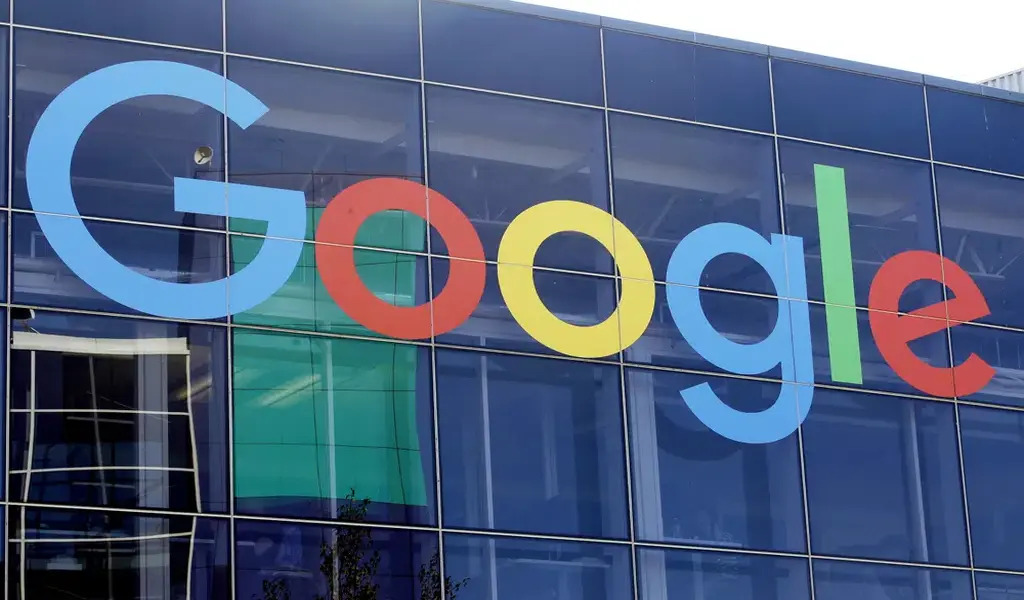News
Google Sued By Justice Dept. For Dominance In Digital Advertising

(CTN NEWS) – WASHINGTON – On Tuesday, the Justice Department and eight states filed an antitrust lawsuit against Google to break up what they claim is the company’s monopoly over the entire online advertising ecosystem.
This harms advertisers, consumers, and even the United States federal government.
According to the government, Google’s strategy for establishing dominance has been to “neutralise or remove” competitors through acquisitions and to compel advertisers to use its products by making it challenging for them to use those of rivals.
The federal court in Alexandria, Virginia, received the antitrust lawsuit. In a press conference on Tuesday, Attorney General Merrick Garland claimed that “for 15 years.

Attorney General Merrick Garland, joined by Associate Attorney General Vanita Gupta and Assistant Attorney General Jonathan Kanter of the Justice Department’s Antitrust Division, speaks at the Department of Justice in Washington, Tuesday, Jan. 24, 2023. (AP Photo/Carolyn Kaster)
Google has pursued a course of anticompetitive conduct” that has stunted the development of competing technologies and tampered with online ad auction procedures to compel advertisers and publishers to use its products.
He continued, “Google has engaged in exclusionary activity” as a result, the competition in the ad tech sector has been “severely degraded,” if not entirely destroyed.
“First, almost every major online publisher uses Google-controlled technology to sell advertising space on their websites. Second, Google owns the primary mechanism businesses use to purchase that advertising space.
Third, according to Garland, Google owns the largest ad exchange, which connects publishers and advertisers each time advertising space is purchased.
He continued, “as a result, website owners make less money while advertising spends more.”
And because of this, fewer publishers will be able to distribute their material without charging users for subscriptions, paywalls, or other forms of payment.

Attorney General Merrick Garland speaks at the Department of Justice in Washington, Tuesday, Jan. 24, 2023. The Justice Department and eight states sued Google on Tuesday, alleging that its dominance in digital advertising harms competition. (AP Photo/Carolyn Kaster)
The department’s lawsuit accuses Google of monopolizing internet advertising by banning rivals.
This includes deploying technology that locks in the split-second bidding process for ads shown on web pages after its 2008 acquisition of DoubleClick, a powerful ad server.
Large publishers with sizable direct sales can manage their adverts using Google’s ad manager. A real-time marketplace for buying and selling internet display adverts is the ad exchange.
The complaint asks that Google separate three distinct businesses from its main businesses: search, YouTube, and other products like Gmail.
These three businesses are the buying and selling of adverts and the ownership of the exchange where that activity is conducted.
The lawsuit “doubles down on a false premise that would delay innovation, increase advertising rates, and make it more difficult for thousands of small businesses and publishers to succeed,” according to a statement from Alphabet Inc., the parent company of Google.

Attorney General Merrick Garland looks to Assistant Attorney General Jonathan Kanter of the Justice Department’s Antitrust Division as he speaks at the Department of Justice in Washington, Tuesday, Jan. 24, 2023.. (AP Photo/Carolyn Kaster)
A trade association for internet services, of which Google is a member, criticized the lawsuit and its “radical structural remedies” as being inappropriate.
The assertion by the government that digital ads aren’t in competition with print, broadcast, and outdoor advertising defies rationality, according to Matt Schruers, president of the Computer & Communications Industry Association.
Dina Srinivasan, a fellow at Yale University and an expert in adtech, called the action “significant” since it unites the state and federal governments of the entire country in a politicized legal campaign against Google.
According to Srinivasan, online advertising is ” dysfunctional and ineffective.”
It is “an outrageous inefficiency to have baked into the US economy” because intermediaries receive 30% to 50% of the take on each ad trade.
“A tremendous tax on the open internet and customers in general,” she referred to it as. Additionally, it directly impacts whether a free press can exist.
It has taken time for federal and state authorities and legislators to catch up with and comprehend the internet ad industry, similar to many other extremely sophisticated technical marketplaces.

According to Srinivasan, it took them ten years to realize the dangers of high-speed trading in the financial markets and start taking steps to prevent it.
According to research firm Insider Intelligence, Google had close to 29% of the U.S. digital advertising industry in 2022, which includes all the advertisements people see on computers, phones, tablets, and other internet-connected devices.
Meta, the parent company of Facebook, is second with around 20% of the market. With more than 11%, Amazon is a far-off third place that is rising.
According to Insider, Amazon and TikTok are predicted to grow, while Google and Meta’s ads market share will decrease.
The Justice Department or regional state governments have recently filed a lawsuit against Google.
For instance, the Trump administration and 11 state attorneys general filed a lawsuit against Google in October 2020, saying that the company had engaged in anticompetitive behavior in the search and search advertising industries.

Attorney General Merrick Garland, joined by Associate Attorney General Vanita Gupta, speaks at the Department of Justice in Washington, Tuesday, Jan. 24, 2023. The Justice Department and several states have sued Google, alleging that its dominance in digital advertising harms competition. (AP Photo/Carolyn Kaster)
The Justice Department’s top antitrust official, Assistant Attorney General Jonathan Kanter, responded,
“We conducted our own investigation, and that investigation occurred over many years,” when questioned about why the department would file the lawsuit when states have already filed similar complaints.
He asserted that the nearly 150-page Justice Department case has “many facts, many instances that individually and collectively” demonstrate several monopolies.
In essence, the Biden administration and the new states are aligned with the 35 states and the District of Columbia that sued Google in December 2020 over the same concerns thanks to Tuesday’s complaint.
California, Virginia, Connecticut, Colorado, New Jersey, New York, Rhode Island, and Tennessee are among the states that are party to the lawsuit.
RELATED CTN NEWS:
Chinese E-commerce Platform ‘Taobao’ Offers Thailand VIP Packages

News
Google’s Search Dominance Is Unwinding, But Still Accounting 48% Search Revenue

Google is so closely associated with its key product that its name is a verb that signifies “search.” However, Google’s dominance in that sector is dwindling.
According to eMarketer, Google will lose control of the US search industry for the first time in decades next year.
Google will remain the dominant search player, accounting for 48% of American search advertising revenue. And, remarkably, Google is still increasing its sales in the field, despite being the dominating player in search since the early days of the George W. Bush administration. However, Amazon is growing at a quicker rate.
Google’s Search Dominance Is Unwinding
Amazon will hold over a quarter of US search ad dollars next year, rising to 27% by 2026, while Google will fall even more, according to eMarketer.
The Wall Street Journal was first to report on the forecast.
Lest you think you’ll have to switch to Bing or Yahoo, this isn’t the end of Google or anything really near.
Google is the fourth-most valued public firm in the world. Its market worth is $2.1 trillion, trailing just Apple, Microsoft, and the AI chip darling Nvidia. It also maintains its dominance in other industries, such as display advertisements, where it dominates alongside Facebook’s parent firm Meta, and video ads on YouTube.
To put those “other” firms in context, each is worth more than Delta Air Lines’ total market value. So, yeah, Google is not going anywhere.
Nonetheless, Google faces numerous dangers to its operations, particularly from antitrust regulators.
On Monday, a federal judge in San Francisco ruled that Google must open up its Google Play Store to competitors, dealing a significant blow to the firm in its long-running battle with Fortnite creator Epic Games. Google announced that it would appeal the verdict.
In August, a federal judge ruled that Google has an illegal monopoly on search. That verdict could lead to the dissolution of the company’s search operation. Another antitrust lawsuit filed last month accuses Google of abusing its dominance in the online advertising business.
Meanwhile, European regulators have compelled Google to follow tough new standards, which have resulted in multiple $1 billion-plus fines.

Pixa Bay
Google’s Search Dominance Is Unwinding
On top of that, the marketplace is becoming more difficult on its own.
TikTok, the fastest-growing social network, is expanding into the search market. And Amazon has accomplished something few other digital titans have done to date: it has established a habit.
When you want to buy anything, you usually go to Amazon, not Google. Amazon then buys adverts to push companies’ products to the top of your search results, increasing sales and earning Amazon a greater portion of the revenue. According to eMarketer, it is expected to generate $27.8 billion in search revenue in the United States next year, trailing only Google’s $62.9 billion total.
And then there’s AI, the technology that (supposedly) will change everything.
Why search in stilted language for “kendall jenner why bad bunny breakup” or “police moving violation driver rights no stop sign” when you can just ask OpenAI’s ChatGPT, “What’s going on with Kendall Jenner and Bad Bunny?” in “I need help fighting a moving violation involving a stop sign that wasn’t visible.” Google is working on exactly this technology with its Gemini product, but its success is far from guaranteed, especially with Apple collaborating with OpenAI and other businesses rapidly joining the market.
A Google spokeswoman referred to a blog post from last week in which the company unveiled ads in its AI overviews (the AI-generated text that appears at the top of search results). It’s Google’s way of expressing its ability to profit on a changing marketplace while retaining its business, even as its consumers steadily transition to ask-and-answer AI and away from search.

Google has long used a single catchphrase to defend itself against opponents who claim it is a monopoly abusing its power: competition is only a click away. Until recently, that seemed comically obtuse. Really? We are going to switch to Bing? Or Duck Duck Go? Give me a break.
But today, it feels more like reality.
Google is in no danger of disappearing. However, every highly dominating company faces some type of reckoning over time. GE, a Dow mainstay for more than a century, was broken up last year and is now a shell of its previous dominance. Sears declared bankruptcy in 2022 and is virtually out of business. US Steel, long the foundation of American manufacturing, is attempting to sell itself to a Japanese corporation.
SOURCE | CNN
News
2024 | Supreme Court Won’t Hear Appeal From Elon Musk’s X Platform Over Warrant In Trump Case

Washington — Trump Media, The Supreme Court announced Monday that it will not hear an appeal from social media platform X about a search warrant acquired by prosecutors in the election meddling case against former President Donald Trump.
The justices did not explain their rationale, and there were no recorded dissents.
The firm, which was known as Twitter before being purchased by billionaire Elon Musk, claims a nondisclosure order that prevented it from informing Trump about the warrant obtained by special counsel Jack Smith’s team violated its First Amendment rights.
The business also claims Trump should have had an opportunity to exercise executive privilege. If not reined in, the government may employ similar tactics to intercept additional privileged communications, their lawyers contended.
Supreme Court Won’t Hear Appeal From Elon Musk’s X Platform Over Warrant In Trump Case
Two neutral electronic privacy groups also joined in, urging the high court to hear the case on First Amendment grounds.
Prosecutors, however, claim that the corporation never shown that Trump utilized the account for official purposes, therefore executive privilege is not a problem. A lower court also determined that informing Trump could have compromised the current probe.

Trump utilized his Twitter account in the weeks preceding up to his supporters’ attack on the Capitol on January 6, 2021, to spread false assertions about the election, which prosecutors claim were intended to create doubt in the democratic process.
The indictment describes how Trump used his Twitter account to encourage his followers to travel to Washington on Jan. 6, pressuring Vice President Mike Pence to reject the certification, and falsely claiming that the Capitol crowd, which battered police officers and destroyed glass, was peaceful.
Supreme Court Won’t Hear Appeal From Elon Musk’s X Platform Over Warrant In Trump Case
That case is now moving forward following the Supreme Court’s verdict in July, which granted Trump full immunity from criminal prosecution as a former president.
The warrant arrived at Twitter amid quick changes implemented by Musk, who bought the company in 2022 and has since cut off most of its workforce, including those dedicated to combating disinformation and hate speech.
SOURCE | AP
News
The Supreme Court Turns Down Biden’s Government Appeal in a Texas Emergency Abortion Matter.

(VOR News) – A ruling that prohibits emergency abortions that contravene the Supreme Court law in the state of Texas, which has one of the most stringent abortion restrictions in the country, has been upheld by the Supreme Court of the United States. The United States Supreme Court upheld this decision.
The justices did not provide any specifics regarding the underlying reasons for their decision to uphold an order from a lower court that declared hospitals cannot be legally obligated to administer abortions if doing so would violate the law in the state of Texas.
Institutions are not required to perform abortions, as stipulated in the decree. The common populace did not investigate any opposing viewpoints. The decision was made just weeks before a presidential election that brought abortion to the forefront of the political agenda.
This decision follows the 2022 Supreme Court ruling that ended abortion nationwide.
In response to a request from the administration of Vice President Joe Biden to overturn the lower court’s decision, the justices expressed their disapproval.
The government contends that hospitals are obligated to perform abortions in compliance with federal legislation when the health or life of an expectant patient is in an exceedingly precarious condition.
This is the case in regions where the procedure is prohibited. The difficulty hospitals in Texas and other states are experiencing in determining whether or not routine care could be in violation of stringent state laws that prohibit abortion has resulted in an increase in the number of complaints concerning pregnant women who are experiencing medical distress being turned away from emergency rooms.
The administration cited the Supreme Court’s ruling in a case that bore a striking resemblance to the one that was presented to it in Idaho at the beginning of the year. The justices took a limited decision in that case to allow the continuation of emergency abortions without interruption while a lawsuit was still being heard.
In contrast, Texas has been a vocal proponent of the injunction’s continued enforcement. Texas has argued that its circumstances are distinct from those of Idaho, as the state does have an exemption for situations that pose a significant hazard to the health of an expectant patient.
According to the state, the discrepancy is the result of this exemption. The state of Idaho had a provision that safeguarded a woman’s life when the issue was first broached; however, it did not include protection for her health.
Certified medical practitioners are not obligated to wait until a woman’s life is in imminent peril before they are legally permitted to perform an abortion, as determined by the state supreme court.
The state of Texas highlighted this to the Supreme Court.
Nevertheless, medical professionals have criticized the Texas statute as being perilously ambiguous, and a medical board has declined to provide a list of all the disorders that are eligible for an exception. Furthermore, the statute has been criticized for its hazardous ambiguity.
For an extended period, termination of pregnancies has been a standard procedure in medical treatment for individuals who have been experiencing significant issues. It is implemented in this manner to prevent catastrophic outcomes, such as sepsis, organ failure, and other severe scenarios.
Nevertheless, medical professionals and hospitals in Texas and other states with strict abortion laws have noted that it is uncertain whether or not these terminations could be in violation of abortion prohibitions that include the possibility of a prison sentence. This is the case in regions where abortion prohibitions are exceedingly restrictive.
Following the Supreme Court’s decision to overturn Roe v. Wade, which resulted in restrictions on the rights of women to have abortions in several Republican-ruled states, the Texas case was revisited in 2022.
As per the orders that were disclosed by the administration of Vice President Joe Biden, hospitals are still required to provide abortions in cases that are classified as dire emergency.
As stipulated in a piece of health care legislation, the majority of hospitals are obligated to provide medical assistance to patients who are experiencing medical distress. This is in accordance with the law.
The state of Texas maintained that hospitals should not be obligated to provide abortions throughout the litigation, as doing so would violate the state’s constitutional prohibition on abortions. In its January judgment, the 5th United States Circuit Court of Appeals concurred with the state and acknowledged that the administration had exceeded its authority.
SOURCE: AP
SEE ALSO:
Could Last-Minute Surprises Derail Kamala Harris’ Campaign? “Nostradamus” Explains the US Poll.
-

 News4 years ago
News4 years agoLet’s Know About Ultra High Net Worth Individual
-
Entertainment2 years ago
Mabelle Prior: The Voice of Hope, Resilience, and Diversity Inspiring Generations
-
News11 years ago
Enviromental Groups Tell Mekong Leaders Lao Dam Evaluation Process Flawed
-

 Health4 years ago
Health4 years agoHow Much Ivermectin Should You Take?
-

 Tech3 years ago
Tech3 years agoTop Forex Brokers of 2023: Reviews and Analysis for Successful Trading
-

 Lifestyles3 years ago
Lifestyles3 years agoAries Soulmate Signs
-

 Entertainment3 years ago
Entertainment3 years agoWhat Should I Do If Disney Plus Keeps Logging Me Out of TV?
-

 Health3 years ago
Health3 years agoCan I Buy Ivermectin Without A Prescription in the USA?


